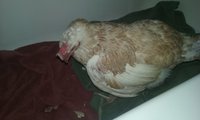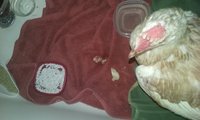- Jun 8, 2016
- 6
- 0
- 60
My 2 yr old laying hen (unknown breed) has been acting uninterested in snacks for 4-5 days. She was fluffed, hunched, squinty eyed, and showed decreased activity. I thought vent gleet and bathed her and fed her yogurt and offered an electrolyte drink (1 gal water, 1tbsp sugar, 1tsp salt, 1tsp baking soda) for 3 days now with no improvement in her condition. 2 nights ago I saw her try to jump to her roost and fail to reach it, so she spent the night standing on the floor of the coop. Now she only stands, squinty eyed sometimes eyes closed, won't sit or roost, and only walks a little, though she doesn't hunch or fluff as much, her wings r droopy. During the baths I noticed the skin around her vent is red and irritated from about an inch or two above the vent and reaching down her belly. Her belly itself seems like it may be a bit swollen, but as she is the only hen of this breed I have, I don't have any reference of what it should feel like. She has been passing strange yellow poops that are liquid and a stringy mucus, and has not had a solid normal poop for 2-3 days as far as I have noticed, maybe longer. I tried massaging her belly in case she was egg bound, but she only passed more of this yellow stuff. I also, for lack of a better word, fingered her vent to try feeling for a stuck egg, but didn't get very far, and didn't feel anything. I brought her into the house this afternoon for a bath, and after let her relax in the dark bathroom. No egg passed. I offered her yogurt which she was only slightly interested in, apple cider vinegar water which she drank lots of, blackstrap molasses water she tried once and hasn't touched since, fresh water she hasn't touched, and layer pellets (her usual food, a feather fixer blend because she and her sisters have a history of pecking) that she also hasn't touched, and oyster shells that she seems to be picking at but not actually eating very much. I am at a loss for what to do now and cannot afford a vet bill. I don't know if it's advanced vent gleet, if she's egg bound, if it's a combination of the two, or something more uncommon like blackhead. She was recently pecked pretty bad and lost almost a quarter of her feathers, and suffered some frostbite on her comb, but was on the mend from those when this started. But before the pecking she used be about half light cream colored and half tan/brown (mixed together so she was speckled, hence her name Speckies) and is now almost completely tan/brown. One spot where she was pecked on her head looks almost grey, but I think the feathers only look that way because they're growing back. I included a pic that shows the top of her head and her "poop". The poop is a bit hard to see, but it's sort of on the left side of the pic. She is now in the house, with everything she could need in the bathtub, and I've made her as comfortable as I can. Any help or advice would be much appreciated.





